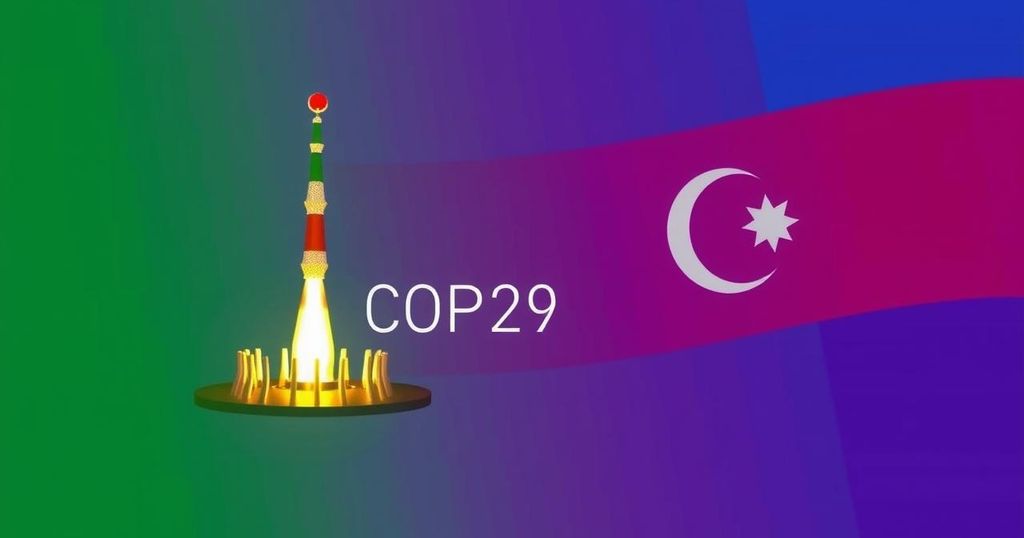Russia and Azerbaijan at COP29: Prioritizing Energy Cooperation Over Climate Action
COP29, held in Baku, saw a significant Russian delegation engage predominantly in discussions about fossil fuel cooperation with Azerbaijan, overshadowing the climate change goals of the conference. Azerbaijani President Ilham Aliyev depicted fossil fuels as divine gifts, while negotiations hinted at potential energy agreements. The summit illustrated a concerning tendency to prioritize energy interests over a genuine commitment to climate action amidst geopolitical tensions.
The UN Climate Change Conference COP29, held in Baku from November 8 to 22, 2023, featured a notably robust Russian delegation comprised of 900 members, significantly increasing its presence compared to prior summits. Journalist Rasmus Canbäck emphasizes that Russia, with Azerbaijan’s collaboration, utilized the conference to discuss gas and oil cooperation while possibly seeking to mitigate international sanctions.
Azerbaijan’s President Ilham Aliyev characterized fossil fuels as a ‘gift of God’ during his opening remarks, which were considered unusually confrontational for a climate event. Despite the summit’s primary objective of combating climate change, the emphasis was largely on energy collaboration and geopolitical alignments rather than environmental commitments. Discussions unfolded about potential agreements regarding Russian gas transit through Ukraine, although Ukraine has indicated intentions to halt such transit by the year’s end.
The COP29 summit served as a platform for consolidating Russian and Azerbaijani ties, with Azerbaijan’s state media highlighting positive relations and Russian officials, including Gazprom executive members, actively participating. This setting also allowed for significant negotiations, despite Azerbaijan’s attempts to maintain a balance in its diplomatic relationships.
Critique arose as Azerbaijan’s media extolled Russian involvement, contrasting with Russia’s receipt of dubious climate awards, once again underscoring a disconnect between rhetoric and action regarding climate change. Russian climate advocacy, such as a recently signed agreement for carbon waste processing, appeared to serve more to enhance image than to drive substantial environmental initiatives. Furthermore, reports indicated that Azerbaijan’s gas needs necessitate increasing imports from Russia, creating additional dependencies amidst overarching EU energy goals to phase out Russian gas by 2027.
The UN Climate Change Conference, COP29, was intended to discuss and negotiate frameworks aimed at combating climate change and shifting from fossil fuels to renewable energy sources. However, the involvement of Russia and Azerbaijan shifted the conference’s focus towards energy cooperation and geopolitical alignment. Russia’s increasing presence at COP29 raised concerns regarding its intentions, particularly in light of its reliance on fossil fuels for revenue and its strategic partnerships with post-Soviet states, such as Azerbaijan. The conference unfolded against a backdrop of strained relations with the West, particularly following Russia’s invasion of Ukraine, and the exploration of alternatives to circumvent sanctions through energy deals with allies like Azerbaijan.
The outcomes of COP29 are indicative of a divergence between public commitments to combat climate change and the underlying geopolitical and economic agendas at play. Russia and Azerbaijan’s strategic alliance within the energy sector emphasizes mutual benefits over environmental considerations, positioning fossil fuel cooperation at the forefront. COP29 thus underscores the challenge of aligning global climate ambitions with national interests, particularly in scenarios where fossil fuels remain the predominant source of revenue, as evidenced by Azerbaijan’s heavy reliance on such resources.
Original Source: theins.ru




Post Comment